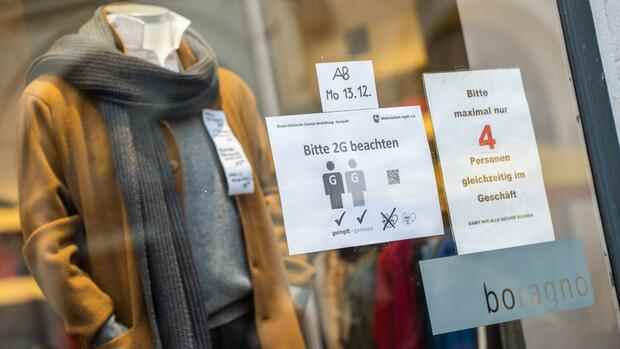The retail sector suffers sales losses due to the access restrictions – and is accordingly reluctant to search for new employees.
(Photo: dpa)
Berlin New corona restrictions and concerns about the spread of the dangerous Omicron variant are increasingly reflected in the labor market. The Ifo employment barometer, which is calculated monthly exclusively for the Handelsblatt, fell to 102.9 points in December. In November it was 103.9 meters.
“Due to the corona wave, the hospitality industry, the event industry and tourism are announcing layoffs,” commented Ifo expert Klaus Wohlrabe on the latest data, which are based on the employment intentions of around 9,000 companies. This shows the effects of restrictions in restaurants, hotels and travel, or the ban on larger events such as trade fairs.
Only the manufacturing industry turned out to be the anchor of stability in employment policy at the end of the year. When it comes to new hires, industrial companies are more optimistic than in the previous month. “The very good order situation should be managed with increased staff in the next year,” says Wohlrabe.
According to the Federal Statistical Office, industrial orders in October fell by a hefty 6.9 percent compared to the previous month. In the months from January to October, however, they were cumulative a good fifth above the previous year’s level.
Top jobs of the day
Find the best jobs now and
be notified by email.
And incoming orders in October were 1.7 percent above the level from February 2020 – the last month before the start of the corona restrictions in Germany. In view of the widespread production bottlenecks, the industry’s order backlog has grown continuously since June 2020 and, according to the Federal Statistical Office, reached its highest level in October since the relevant statistics began in January 2015.
Service providers expect some layoffs
The service providers, on the other hand, have corrected their personnel planning significantly downwards. They were last more pessimistic about the employment outlook in July of this year. According to the Ifo Institute, layoffs can even be expected in consumer-related services.
In the construction industry, too, which is booming despite Corona, companies are again more cautious in December than in November, when the sub-indicator for the industry climbed to its highest level since May 2019. At the end of the year, however, their employment expectations are still well above the values from spring and summer.
The trade, which achieves a significant part of its annual sales in the Christmas business, is currently going through a rollercoaster of emotions. Easements such as in Lower Saxony, where the Higher Administrative Court recently overturned the 2G rule for access to shops, are offset by ongoing discussions about the need for a new nationwide lockdown. Accordingly, retailers are exercising caution and are currently hardly willing to hire new staff.
Even if the corona worries are increasing again, the labor market has so far coped with the pandemic well – and the Federal Employment Agency (BA) sees it continue to recover. For example, the number of vacancies registered with the BA, the corona-related slump from 2020 is now more than balanced.
If you also take into account the vacancies that have not been reported, according to the Institute for Employment Research (IAB) there were almost 1.4 million vacancies in Germany in the third quarter – slightly more than in the third quarter of 2019.
Around a fifth of employees work in the low-wage sector
On Monday, the Federal Statistical Office provided new nourishment in the debate about the increase in the minimum wage to twelve euros planned by the traffic light government. According to this, almost 7.2 million employees would benefit from this increase.
According to statisticians, a total of around 7.8 million people were working in the low-wage sector in April, which corresponds to around a fifth of all employees. They earn less than two thirds of the median wage of all employees. This low wage threshold is currently 12.27 euros gross per hour.
More: The next corona shock: For these four reasons, the German economy is currently shrinking again
